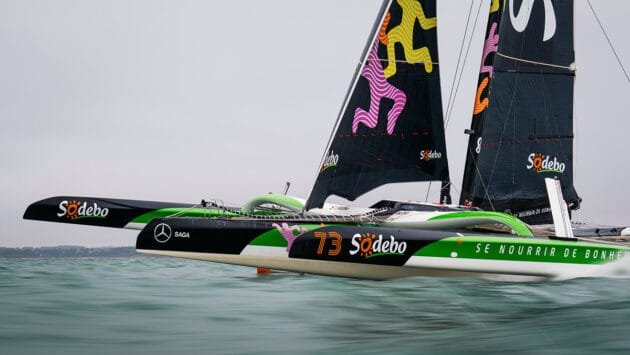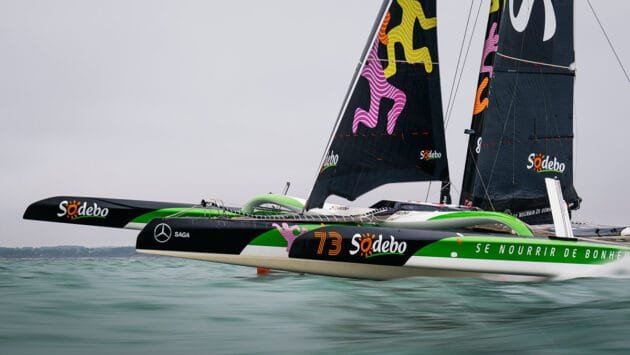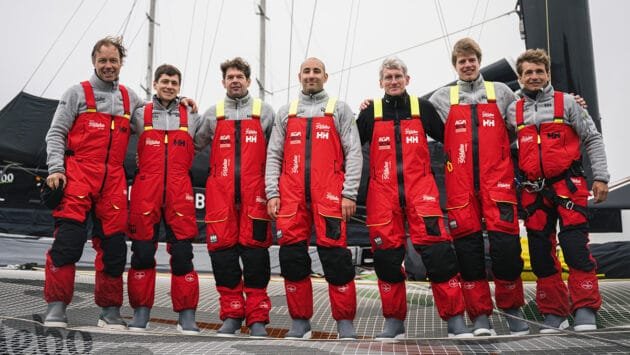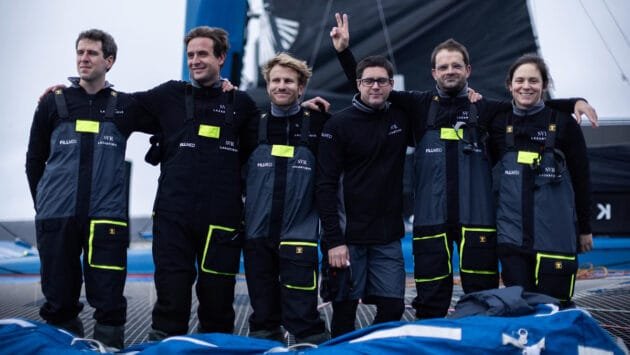
Sodebo Ultim 3 Skipper Thomas Coville Départ ponton pour la tentative de record sur le Trophée Jules Verne. Lorient 29 novembre 2024 crédit Vincent Curutchet / Team Sodebo


The two crews are both attempting to break the non-stop, around the world record Jules Verne Trophy which currently stands at 40 days, 23 hours, 30 minutes and 30 seconds.
Thomas Coville’s Sodebo Ultim 3 was first to start, crossing the virtual start line off Brest in western France, at 2103 last night, Friday 29 November. The ‘line’ is between Ouessant and the Lizard, UK.
The crew set off at nearly 30 knots, though this morning were some 100 miles behind the equivalent pace set by current record holder IDEC Sport.

In order to break the record, Sodebo will need to return to cross the line by January 9, 2025 at 2034hrs.
Francois Gabart’s SVR-Lazartigue then set off this morning, Saturday 30 November, at 08.51 (local time). They will need to return by the morning of January 10 in order to break the record.
Record-breaking routing
Both teams set off independently, but their weather routing teams have identified the same weather window which is currently forecasting the boats to reach the Equator in around five days.
In order to be in with a shout of beating the record, they will then need to be at the Cape of Good Hope within a dozen days of starting. Both teams progressively went from ‘Code Orange’ standby mode, to ‘Code Green’ before starting just 12 hours apart.
Thomas Coville, skipper of Sodebo, explained: “The transition from orange to green is often quite brutal, you have to change mode and mentality.
“Personally, what helps me to switch is when I get dressed in my sea gear, when I put on my boots, it allows me to enter another world, that of a sailor.”
Crew member and navigator Benjamin Schwartz explained the team’s start strategy: “We will set off close-hauled/reaching to look for a first front in the south of a depression, with a tack planned for Saturday afternoon, then dive south in a wind that will pick up, so downwind.
“The objective is to go around the Azores high from the east and slip under it for a final gybe, probably Monday morning, which will take us straight towards the equator in about five days, so a little ahead of the record time.”
But he cautions: “The window is quite short, insofar as the Azores High tends to emit a ridge (an extension) which closes the route to Portugal, so we will have to manage to slip into a fairly narrow corridor in time.”
Jules Verne Trophy crews
Sodebo is sailing with a crew of seven: Thomas Coville, Frédéric Denis, Pierre Leboucher, Léonard Legrand, Guillaume Pirouelle, Benjamin Schwartz and Nicolas Troussel.

Sodebo is sailing with a crew of seven: Thomas Coville, Frédéric Denis, Pierre Leboucher, Léonard Legrand, Guillaume Pirouelle, Benjamin Schwartz and Nicolas Troussel.
For the Jules Verne Trophy the teams may use on shore routers, and each will have a team monitoring the weather, position of ice, and potential routing strategies. Sodebo’s is headed up by Philippe Legros and Simon Fisher, while SVR-Lazartigue’s router is Jean-Yves Bernot.
Record holders rematch
The current time was set by Francis Joyon on IDEC Sport in 2017, when his six-man crew completed a non-stop circumnavigation – in the non-foiling trimaran – at a blistering average speed of 26.8 knots.
Both skippers have claimed the solo non-stop around the world record, Coville setting a record time in December 2016 of 49d 3h 7m 38s.
The two crews are both attempting to break the non-stop, around the world record – the ‘no limits’ Jules Verne Trophy – which currently stands at 40 days, 23 hours, 30 minutes and 30 seconds.
Sodebo’s tracker shows the bid’s progress against current Jules Verne Trophy record holder IDEC Sport.
Record-breaking routing
Both teams set off independently, but their weather routing teams have identified the same weather window which is currently forecasting the boats to reach the Equator in around five days.
In order to be in with a shout of beating the record, they will then need to be at the Cape of Good Hope within a dozen days of starting. Both teams progressively went from ‘Code Orange’ standby mode, to ‘Code Green’ before starting just 12 hours apart.

SVR-Lazartigue is sailing with six: Francois Gabart, Tom Laperche, Pascal Bidégorry, Amélie Grassi, Antoine Gautier, and Émilien Lavigne.
Skipper Francois Gabart, third from left, and the SVR-Lazartigue crew setting off on their way to the Jules Verne Trophy start line in Brest on Saturday, 30 November 2024. Photo: Clement Gerbaud/SVR-Lazartigue
For the Jules Verne Trophy the teams may use on shore routers, and each will have a team monitoring the weather, position of ice, and potential routing strategies. Sodebo’s is headed up by Philippe Legros and Simon Fisher, while SVR-Lazartigue’s router is Jean-Yves Bernot.
Record holders rematch
The current time was set by Francis Joyon on IDEC Sport in 2017, when his six-man crew completed a non-stop circumnavigation – in the non-foiling trimaran – at a blistering average speed of 26.8 knots.
Both skippers have claimed the solo non-stop around the world record, Coville setting a record time in December 2016 of 49d 3h 7m 38s.
Gabart set the current benchmark of 42d 16h 40m 35s the following year – remarkably just two days slower than the crewed record they are both attempting to beat, including an astonishing 24hr record of 851 miles solo.
Going head to head
In 2016, IDEC Sport and Spindrift 2 set off within hours of each other, in the first ‘head-to-head’ Jules Verne attempt. Both teams made it round, but neither broke the record.
The last time two boats set off together was in 2020, when Gitana 17 and Sodebo started within hours of each other in late November.
Both retired from their attempt early: Gitana turning back after three days after colliding with a ‘UFO’ (unidentified floating object), while Sodebo had a great start to their bid – extending to over 200 miles ahead of IDEC Sport’s position, and regularly posting days with 30-35-knot averages.
But by mid-December they too had to retire, after colliding with an underwater object and damaging the starboard rudder.
The foiling Ultims are notoriously vulnerable to collisions, but in February 2024 Charles Caudrelier won the first ever single-handed around the world race in the giant trimarans, after his Gitana 17 made the circumnavigation without stopping for a technical repair (he did stop in the Azores to avoid ‘impassable’ conditions in the Bay of Biscay, with a forecast of 7-10m waves and 50 knot winds). That passage proved it can be done.